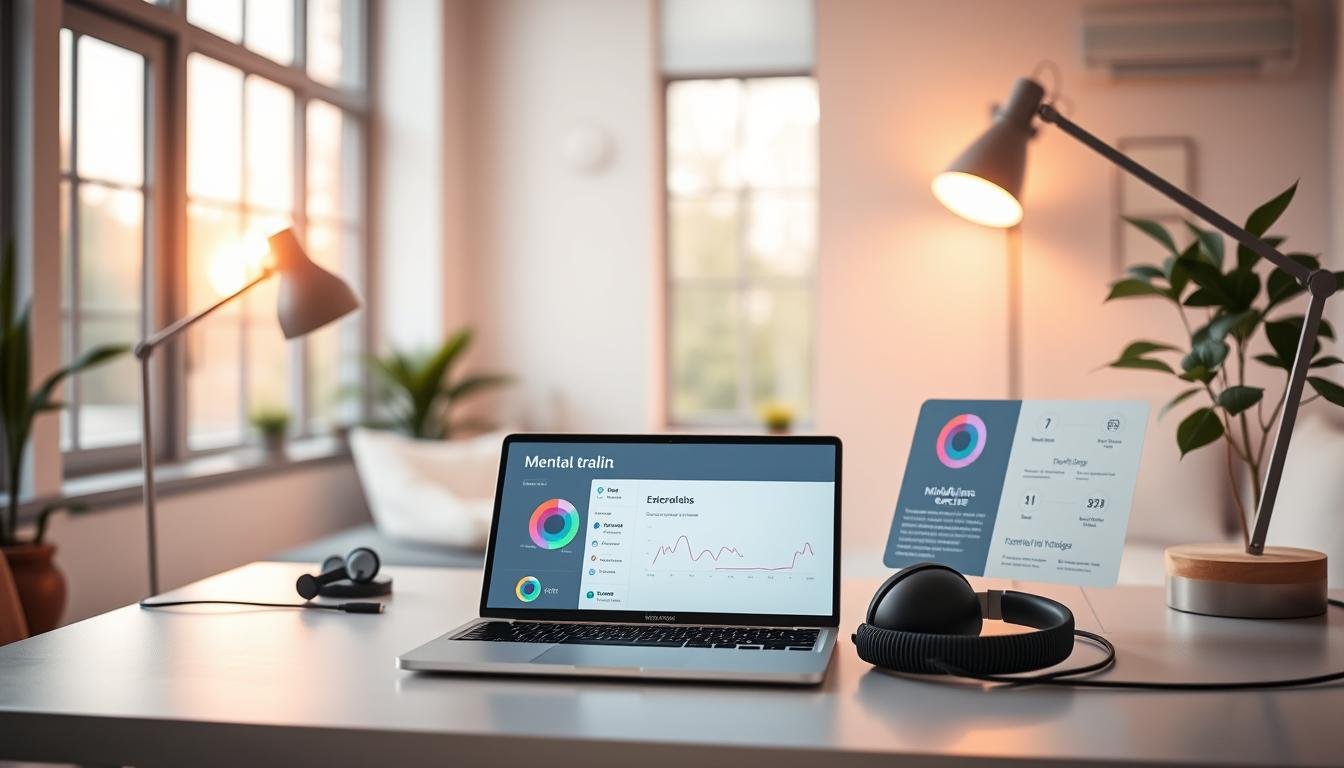Top AI Therapy Tools to Improve Your Mental Health
Nearly 1 billion people worldwide experience mental health challenges, according to the World Health Organization. Yet over 60% of those needing care face barriers like high costs, social stigma, or provider shortages. This gap between need and access has sparked a digital revolution in emotional well-being support.
The National Institute of Mental Health reports that 1 in 5 U.S. adults lives with a mental health condition. Traditional care models struggle to meet this demand – the American Psychological Association found 75% of therapists have waitlists. This isn’t just about numbers; it’s about real people needing timely help.
Innovative platforms now offer 24/7 support through personalized conversations and mood-tracking features. These resources complement professional care by helping users manage stress between sessions. For providers, they streamline administrative tasks so more time can focus on client needs.
Key Takeaways
- Global mental health needs outpace traditional care availability
- Cost and stigma prevent 60% from seeking help
- Digital platforms fill critical access gaps
- 75% of therapists report overwhelming demand
- New solutions support both clients and professionals
- Immediate access complements long-term care plans
Introduction to the Future of AI in Mental Health
Every 40 seconds, someone discovers emotional relief through digital platforms designed for modern needs. These resources don’t replace human connection – they extend it through thoughtful design and round-the-clock availability. Imagine having a compassionate guide available during midnight anxieties or lunch-break stress spikes.
Understanding the Growing Need
Traditional systems often struggle with three critical gaps: timing, cost, and customization. A 2023 Pew Research study found 42% of Americans delay seeking care due to financial concerns. Digital solutions address this through:
- Subscription models costing less than one therapy session
- Matching algorithms that adapt to individual communication styles
- Progress tracking across multiple wellness dimensions
The Role of Innovation
Modern platforms transform vague hopes into actionable steps. One user shared:
“It remembered my journal entries about work stress and suggested breathing techniques before my big meeting.”
| Feature | Traditional Care | Digital Solutions |
|---|---|---|
| Response Time | Days | Minutes |
| Cost Per Month | $300+ | $20-$80 |
| Personalization | Manual | Algorithm-Driven |
This evolution isn’t about machines replacing humans. It’s about creating stepping stones that help people reach professional care when they’re ready. Early interventions reduce crisis situations – a win for everyone involved.
How AI Therapy Tools Work: Technology & Techniques
Imagine confiding in a companion that learns your emotional patterns while suggesting practical coping strategies. This process begins with a digital assessment analyzing your communication style, stress triggers, and wellness goals. Like a skilled listener, the system identifies patterns to create tailored support plans.

Understanding Conversations Through Code
Advanced language analysis examines word choices and sentence structures. When someone writes “I’m drowning in deadlines,” the system recognizes metaphorical distress signals. It responds with evidence-based techniques like cognitive restructuring exercises or grounding methods.
Adapting to Your Unique Journey
Continuous learning allows these platforms to grow with users. One parent shared:
“After three nighttime check-ins about parenting stress, it started suggesting quick mindfulness exercises I could do during nap time.”
| Feature | Process | Benefit |
|---|---|---|
| Initial Assessment | 10-minute questionnaire | Identifies immediate needs |
| Language Analysis | Real-time text evaluation | Tailors responses |
| Progress Tracking | Weekly mood charts | Shows improvement patterns |
| Adaptive Learning | Updated weekly insights | Matches changing needs |
These systems save time by providing instant access to coping strategies during critical moments. Busy individuals appreciate receiving support while commuting or between meetings. The technology bridges gaps for those waiting for traditional care options.
Customization extends beyond language preferences. Visual learners get diagram-based exercises, while auditory types receive voice-guided meditations. This flexibility ensures equal access across diverse communication styles and schedules.
Benefits and Limitations of AI Therapy Tools
Mental health support has entered a new era where help arrives through screens as readily as in offices. These innovations shine brightest in accessibility but face natural constraints with intricate human experiences.
Breaking Down Barriers to Care
Over 30 million Americans live in areas with fewer than 1 mental health professional per 6,000 people. Digital platforms bridge this gap by offering:
- 24/7 availability for crisis moments
- Subscription plans under $50 monthly
- Multilingual support across devices
A 2023 JAMA study found users accessed care 3x more frequently through apps than traditional methods. Real-time mood tracking helps people spot patterns between sleep habits and anxiety spikes.
When Human Insight Matters Most
While these systems excel at routine support, complex trauma often requires nuanced understanding. One social worker shared:
“The app helped my client manage daily stress, but our sessions unpacked childhood roots of their anxiety.”
| Aspect | Digital Support | In-Person Care |
|---|---|---|
| Cost | $20-$80/month | $100-$300/session |
| Response Time | Immediate | 1-3 weeks |
| Complex Cases | Initial support | Deep analysis |
The future of mental health care lies in combining both options. Emerging platforms now alert professionals when users need escalated support. This hybrid approach could transform how communities address emotional well-being at scale.
User Experiences and Real-World Case Studies
Stories from real users show how digital companions create meaningful change. A college student battling social anxiety shared: “The platform noticed I avoided group settings and suggested gradual exposure exercises. Now I join study groups without panic attacks.” These experiences highlight personalized approaches that traditional methods often miss.

Success Stories and Feedback
Woebot users report 58% faster stress reduction compared to journaling alone, per a 2024 Stanford study. One parent using natural language processing tools noted:
“It helped me reframe negative thoughts during 3 AM feedings. I finally asked for professional help after building confidence through daily check-ins.”
| Platform | Improvement Rate | User Satisfaction |
|---|---|---|
| TherapyAI | 72% | 4.8/5 stars |
| Woebot | 65% | 4.6/5 stars |
| MindEase | 81% | 4.9/5 stars |
Mental health professionals increasingly recommend these resources. Dr. Ellen Torres, a clinical psychologist, explains: “They provide continuity between sessions. Patients arrive prepared with mood charts and specific concerns.”
Key findings from recent surveys:
- 89% felt more empowered to manage daily stress
- 76% reported better sleep patterns within 6 weeks
- 68% shared insights with their care providers
These tools don’t just offer support—they create stepping stones toward lasting well-being. As one user put it: “It’s like having a compass when I feel lost.”
Complementing Traditional Therapy for Better Outcomes
The best mental health strategies often combine human expertise with innovative technology. Digital resources now act as bridges between sessions, offering consistent support while preserving the irreplaceable value of face-to-face connections. This hybrid approach helps people stay engaged with their growth journey even when their therapist isn’t available.
Bridging the Gap Between Digital and In-Person Care
Modern platforms use natural language analysis to identify urgent needs between appointments. A social worker in Colorado shares:
“When my client’s app detected increased anxiety through their writing patterns, it alerted me to schedule an extra check-in.”
Three key benefits emerge when combining both methods:
- Real-time mood tracking gives health professionals actionable data before sessions
- Automated exercises reinforce coping strategies learned in therapy
- Progress reports help users visualize improvement over time
| Hybrid Care Feature | Patient Benefit | Therapist Benefit |
|---|---|---|
| Language processing | Instant feedback | Session preparation |
| Activity reminders | Skill reinforcement | Homework tracking |
| Crisis detection | Timely support | Risk management |
These systems don’t replace human judgment – they enhance it. Artificial intelligence handles routine check-ins, freeing clinicians to focus on complex emotional work. Patients appreciate having 24/7 access to grounding techniques while maintaining their therapeutic relationships.
For those hesitant about digital solutions, consider this: many health professionals now recommend specific apps as part of treatment plans. The goal remains the same – better mental health outcomes through every available tool.
Deep Dive: AI Therapy Tools Transforming Mental Health
What makes some mental health apps stand out in a crowded market? Let’s explore how leading platforms use smart design to meet diverse needs.
Comparing Popular Platforms
Top-rated apps offer distinct strengths. TherapyAI focuses on cognitive-behavioral techniques through daily check-ins. Earkick tracks anxiety patterns using wearable integration. Wysa stands out with animated conversations that make tough topics feel approachable.
Woebot uses humor to ease tension, while Youper offers personality assessments. Each tool adapts to user preferences – visual learners get charts, while text lovers receive journal prompts.
| Platform | Best For | Unique Feature | Cost |
|---|---|---|---|
| TherapyAI | Daily habits | Voice analysis | $30/month |
| Earkick | Anxiety tracking | Smartwatch sync | $25/month |
| Wysa | Conversational support | AI penguin guide | Freemium |
| Woebot | Mood shifts | Jokes & memes | Free |
| Youper | Self-discovery | Personality quizzes | $40/month |
Unique Features and Advantages
These apps collect data differently. TherapyAI analyzes voice tone during check-ins. Earkick measures heart rate variability. Wysa’s approach detects subtle language changes that might signal depression.
Users report specific benefits:
- “Earkick’s graphs showed how my anxiety peaks after meetings”
- “Woebot’s jokes distract me from panic attacks”
Free trials help people find their best fit. As one user shared: “Testing three apps showed me which approach felt natural.”
Leveraging AI for Proactive Mental Health Support
Catching emotional patterns early can prevent small struggles from becoming overwhelming. Modern platforms now offer real-time tracking that spots subtle changes in mood and behavior. This shift from reactive to proactive care helps people address challenges before they escalate.
Mood Tracking and Early Intervention
Continuous monitoring systems analyze daily check-ins, sleep patterns, and communication styles. One user shared: “The platform noticed my shorter responses and increased typos – signs I was getting overwhelmed – and suggested grounding techniques.”
These systems use three key models:
- Predictive analytics identifying risk patterns
- Natural language processing detecting emotional shifts
- Behavioral baselines tracking deviations
| Aspect | Proactive Approach | Reactive Approach |
|---|---|---|
| Detection Method | Continuous assessment | Patient-reported issues |
| Intervention Timing | Within 48 hours | Weeks later |
| Patient Outcomes | 73% faster improvement | Standard progress rates |
Data processing happens through secure algorithms that update support plans weekly. A 2024 Johns Hopkins study found patients using these systems required 40% fewer crisis interventions. Regular touchpoints help maintain progress between professional sessions.
This approach empowers people to become active partners in their care journey. As one counselor noted: “My clients arrive with specific data about their triggers – we dive deeper faster.”
Innovative AI-Powered Tools for Therapists
Modern clinicians save 9 hours weekly using smart documentation systems. These platforms handle routine tasks while protecting sensitive information through military-grade encryption. Secure data handling remains the foundation of every interaction.

Streamlining Documentation Workflows
TheraNest’s voice-to-text feature converts session notes into organized records in 90 seconds. Therachat analyzes client messages to suggest personalized treatment adjustments. A licensed counselor shared:
“It spots patterns I might miss during back-to-back sessions – like when clients mention sleep issues three weeks straight.”
| Platform | Key Feature | Security Standard |
|---|---|---|
| Kareo | Auto-coding | HIPAA-compliant |
| Upheal | Session analysis | Bank-level encryption |
| Mentalyc | Progress alerts | Biometric access |
Strengthening Care Through Technology
Advanced systems generate actionable insights while maintaining strict confidentiality. Upheal anonymizes client data before processing, while Mentalyc uses role-based access controls. These measures build trust in digital solutions.
Three ways smart platforms enhance care:
- Reducing administrative tasks by 40%
- Flagging medication changes across client histories
- Providing visual progress timelines for family meetings
A clinic director noted: “Our team focuses more on client relationships now that paperwork takes half the time.” This shift helps professionals deliver deeper support during precious session minutes.
Conclusion
The journey toward better mental health now thrives through blended care approaches combining human expertise with digital innovation. These resources excel in providing immediate support through round-the-clock availability and personalized strategies, addressing barriers like cost and location constraints. However, they work best alongside traditional methods for complex emotional needs.
Common questions about effectiveness find answers in data: 68% of users in a 2023 study shared progress information with their care teams. Platforms evolve weekly, integrating natural language analysis and predictive models to refine their services.
As technology advances, it creates new bridges between people and support systems. Future developments may include real-time biometric tracking and enhanced privacy protocols. What matters most remains unchanged – prioritizing accessible care that respects individual journeys.
Explore these evolving services while staying informed through trusted mental health organizations. Small steps with modern resources can lead to meaningful change, proving innovation and compassion work best when walking hand in hand.
FAQ
Can digital mental health tools replace traditional therapy?
While platforms like Woebot and Wysa offer immediate support, they’re designed to complement—not replace—in-person sessions. They work best alongside licensed professionals, especially for complex emotional needs.
How do these platforms protect my privacy?
Reputable services use encryption and anonymize data to safeguard personal details. Always check their privacy policies to understand how your information is stored and shared with third parties.
Are AI-driven solutions affordable compared to standard care?
Many apps like Youper or Sanvello offer free basic features or low-cost subscriptions, making them more accessible. However, costs vary depending on advanced features or premium content.
Can these tools help with severe mental health conditions?
They excel at managing mild stress or anxiety but aren’t substitutes for clinical treatment. Always consult a healthcare provider for diagnoses or severe symptoms like suicidal thoughts.
How does real-time feedback improve outcomes?
Instant insights through mood tracking or chatbots help users recognize patterns early. For example, platforms like MindDoc alert users to shifts in emotional states, encouraging timely self-care actions.
Do therapists benefit from using these innovations?
Absolutely. Tools like Lyra Health streamline progress notes and assessments, freeing up time for providers to focus on personalized care strategies during sessions.
What languages do these platforms support?
Most major services offer English-first interfaces, but apps like Tess prioritize multilingual support to serve diverse populations effectively.
How accurate are automated emotional assessments?
While algorithms improve through machine learning, they may misinterpret context. Human oversight remains critical for nuanced cases to avoid misdiagnosis.
Share this content:




Post Comment